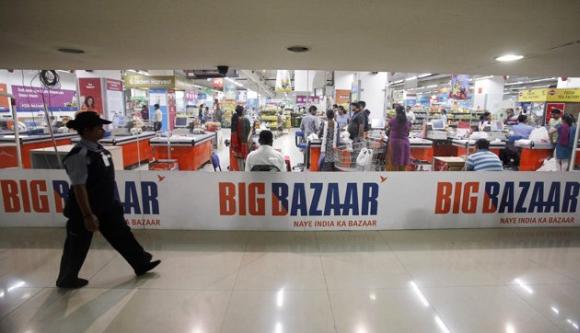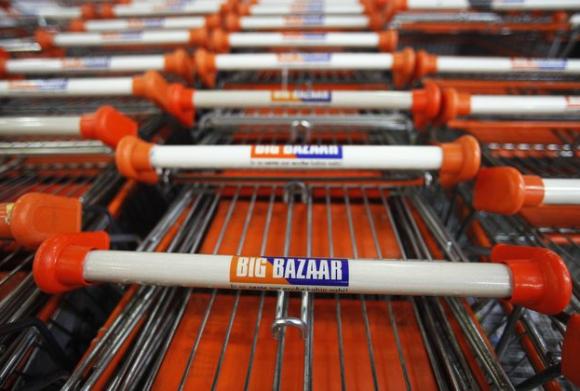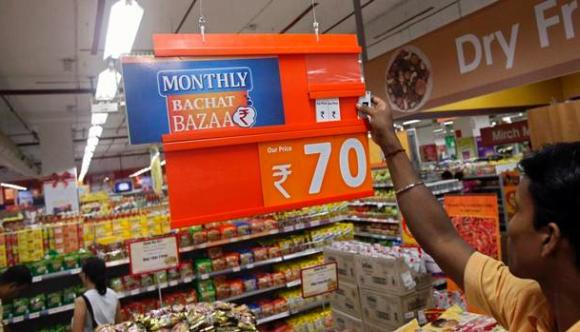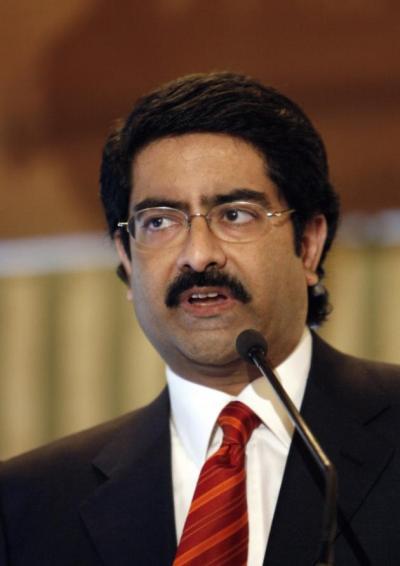Photographs: Courtesy, Future Group Raghavendra Kamath in Mumbai
Kishore Biyani, the founder and chief executive of the Future group, has launched several promotional schemes and marketing events around his retail chain, Big Bazaar, in the past, but nothing compares to the latest, which is called the 'Big Bazaar Profit Club'.
Under this scheme, a customer has to pay Rs 10,000 upfront, after which he can shop for Rs 1,000 a month for 12 months.
In other words, he gets a shopping bonus of 20 per cent. Had the customer put the money in a fixed deposit with a bank, his earnings wouldn't have been more than 9 per cent.
Schemes like this are popular amongst jewellers: Customers pay 12 instalments and the jeweller chips in with the 13th.
This is the first time that a mainstream retailer is trying it out. More important, the scheme gives rise to several questions. One, is this a desperate attempt by the group to improve its cash flows?
...
Will Kishore Biyani's big gamble work?
Image: A security personnel walks past the Big Bazaar retail store in Mumbai.Photographs: Vivek Prakash/Reuters
After all, Biyani has sold assets in the recent past to raise cash. And Future Retail, which owns Big Bazaar, saw negative cash flows of Rs 4.92 crore (Rs 49.2 million) for the 18 months ended December 31, 2012.
Two, won't the scheme squeeze further the margins of the company? It had reported a loss of Rs 20.41 crore (Rs 204.1 million) on a turnover of Rs 1,285.54 crore (Rs 12.85 billion) for the quarter ended December 31, 2012.
Analysts say the scheme will improve the company's sales for the next three or four quarters as it will lock in customers for the next 12 months.
Over 20,000 customers have already signed up for the scheme, meaning Rs 20 crore (Rs 200 milion) has landed in the company's kitty.
"If Big Bazaar can improve sales by 15 to 20 per cent by this way, it will be excellent sales growth for it. For a high-debt company, it is a good scheme given that it need not give back money," says AK Prabhakar, senior vice-president (equity research), Anand Rathi Financial Services.
...
Will Kishore Biyani's big gamble work?
Image: Shopping carts are parked at the Big Bazaar retail store in Mumbai.Photographs: Vivek Prakash/Reuters
Future Retail (earlier known as Pantaloon Retail) has recorded sales of Rs 1,100 crore to Rs 1,200 crore (Rs 11 billion to Rs 12 billion) every quarter for the last five quarters.
Its growth in sales has ranged from 11 per cent to 17 per cent year-on-year and 1 per cent to 6 per cent quarter-on-quarter.
Prabhakar says that this will improve Big Bazaar's sale volumes which, in turn, will give the retailer better bargaining power with the suppliers.
Deep Narayan Mukherjee, director (corporate ratings), India Ratings, believes that for any company, if customers pay in advance, it will help meet the working capital needs better.
High costs
On the flip side, company executives as well as analysts say the scheme is unlikely to have a sizeable impact on the balance sheet of the company.
...
Will Kishore Biyani's big gamble work?
Image: Customers shop at the Big Bazaar retail store in Mumbai.Photographs: Vivek Prakash/Reuters
"Even if 200,000 customers are locked in, the impact on the company's finances will be miniscule, given the size of its balance sheet," Mukherjee says.
If 200,000 customers opt for the scheme, it would rake in Rs 200 crore (Rs 2 billion). The company has debt of around Rs 2,500 crore (Rs 25 billion) on its books as on December 31, 2012. So, it doesn't take care of even 10 per cent of the debt.
"Even if we get 200,000 customers, it will not be large enough to have an impact on the balance sheet," says a Future Retail executive.
That apart, the company has to budget for giving 20 per cent shopping free to the customers who opt for this scheme.
Prabhakar of Anand Rathi says the company effectively has to give 16.5 per cent yield to customers, which could be one or two percentage points higher than the interest it needs to pay on bank loans. In other words, it would be acquiring customers and market share for extra cost.
...
Will Kishore Biyani's big gamble work?
Image: An employee changes the price tag of a product at the Big Bazaar retail store in Mumbai.Photographs: Vivek Prakash/Reuters
"It might pay one or two per cent more but that will be compensated in other ways. It will get assured business, and improve its bargaining power and profit margins," Prabhakar says.
According to the Future Retail executive, the scheme is more of a loyalty programme such as T24 where if offers free talk time to customers. The difference is that it aims to bring back customers 12 times a year.
"In our pilot scheme, we saw the average ticket size of a Big Bazaar Profit Club member is Rs 2,300 per visit, which is almost double the ticket size of a normal shopper," he adds.
Also, says the executive, the scheme helps the company to get customers at less marketing cost.
"Earlier, you got customers at certain marketing cost. Under this scheme, customer acquisition costs will significantly lower which results in better margins," he says.
...
Will Kishore Biyani's big gamble work?
Image: Kumar Mangalam Birla, Chairman of Aditya Birla Group, bought majority stake in Pantaloon Retail.Photographs: Punit Paranjpe/Reuters
The gains
Besides, the company will earn profit margins on all the goods sold to customers, which range from 10 to 18 per cent in FMCG products to 50 per cent in apparels.
So even if Big Bazaar gives goods worth Rs 2,000, it will earn a minimum margin of Rs 200 from each customer.
The executive also denies that the company is doing this to raise fresh funds. "We have reduced our debt significantly. We do not need very high cash infusion now," he says.
Deals with Aditya Birla Nuvo and Warburg Pincus and the creation of a new fashion company resulted in a reduction of around Rs 3,600 crore (Rs 36 billion) in its debt.
Burdened with total debt of over Rs 7,800 crore (Rs 78 billion) in 2011 and significant share of profits going into servicing debt, Biyani had sold a majority stake in his crown jewel, Pantaloon Retail, to Aditya Birla Nuvo.
...
Will Kishore Biyani's big gamble work?
Photographs: Reuters
Biyani also sold his stake in financial services firm Future Capital to private equity firm Warburg Pincus for Rs 560 crore (Rs 5.6 billion).
The creation of new company saw Future Retail's debt of Rs 1,200 crore (Rs 12 billion) shifting to a new entity, Future Lifestyle Fashion. Biyani also sold stake in his life and general insurance businesses.
Will others follow Biyani? Other hypermarket chains say that the scheme is an expensive one, given the freebies and administrative costs involved.
"The cost of managing so many accounts is very high. The administrative costs come to 1-2 per cent. I wonder how they will make money. We can't do it," says the chief executive of a Bangalore-based retail chain.
However, retail consultants say others may come out with similar schemes, depending on the success of Biyani's scheme. At the moment, everybody is waiting and watching.









article